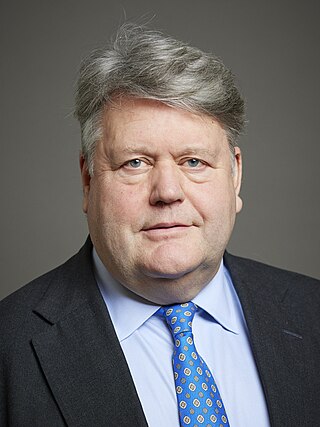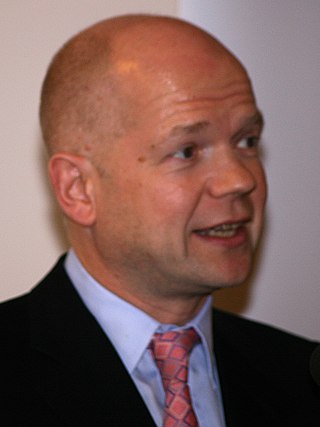Related Research Articles

Robert Arthur Talbot Gascoyne-Cecil, 3rd Marquess of Salisbury, known as Lord Salisbury, was a British statesman and Conservative politician who served as Prime Minister of the United Kingdom three times for a total of over thirteen years. He was also Foreign Secretary before and during most of his tenure. He avoided international alignments or alliances, maintaining the policy of "splendid isolation".
An escrow is a contractual arrangement in which a third party receives and disburses money or property for the primary transacting parties, with the disbursement dependent on conditions agreed to by the transacting parties. Examples include an account established by a broker for holding funds on behalf of the broker's principal or some other person until the consummation or termination of a transaction; or, a trust account held in the borrower's name to pay obligations such as property taxes and insurance premiums. The word derives from the Old French word escroue, meaning a scrap of paper or a scroll of parchment; this indicated the deed that a third party held until a transaction was completed.

Thomas Galloway Dunlop du Roy de Blicquy Galbraith, 2nd Baron Strathclyde,, known informally as Tom Strathclyde, is a British Conservative politician. Lord Strathclyde served in the political role of Leader of the House of Lords from the 2010 general election until January 2013 and as Chancellor of the Duchy of Lancaster, having been Leader of the Opposition in the House of Lords (1998–2010). As of 2024, he is the most recent hereditary peer to serve as Leader of the Lords.

The House of Lords Act 1999 is an act of the Parliament of the United Kingdom that reformed the House of Lords, one of the chambers of Parliament. The Act was given royal assent on 11 November 1999. For centuries, the House of Lords had included several hundred members who inherited their seats ; the Act removed such a right. However, as part of a compromise, the Act allowed ninety-two hereditary peers to remain in the House. Another ten were created life peers to enable them to remain in the House.

The Higher Education Act 2004 is an Act of the Parliament of the United Kingdom that introduced several changes to the higher education system in the United Kingdom, the most important and controversial being a major change to the funding of universities, and the operation of tuition fees, which affects England and Wales. University funding is a devolved matter for Northern Ireland and Scotland. After complex and controversial debates, the Higher Education Bill received royal assent on 1 July 2004.
In many states with political systems derived from the Westminster system, a consolidated fund or consolidated revenue fund is the main bank account of the government. General taxation is taxation paid into the consolidated fund, and general spending is paid out of the consolidated fund.
The Salisbury Convention is a constitutional convention in the United Kingdom under which the House of Lords should not oppose the second or third reading of any government legislation promised in its election manifesto. The origins of the convention date back to the late 19th century, at which time the Conservatives held a majority in the House of Lords and, with the support of the third Marquess of Salisbury, developed the "Referendal Theory", which applied solely to Liberal legislation, under which the House of Lords could obstruct legislation until it had received majority approval at a general election. This was changed following the landslide Labour Party victory in the 1945 general election, which produced a Labour government seen as having a popular mandate for significant reform, while once again there was a Conservative majority in the House of Lords. The fifth Marquess of Salisbury announced that the Lords "would not seek to thwart the main lines of Labour's legislation provided it derived from the party's manifesto for the previous election". From this point, manifesto bills were only to be adjusted by the Lords; however, on non-manifesto bills, the Lords were able to act as they had before.

Robert Michael James Gascoyne-Cecil, 7th Marquess of Salisbury, Baron Gascoyne-Cecil, is a British Conservative politician. From 1979 to 1987 he represented South Dorset in the House of Commons, and in the 1990s he was Leader of the House of Lords under his courtesy title of Viscount Cranborne. Lord Salisbury lives in one of England's largest historic houses, the 17th-century Hatfield House in Hertfordshire, and currently serves as Chancellor of the University of Hertfordshire.

Edward Watson Short, Baron Glenamara, was a British Labour Party politician and deputy leader of the Labour Party. He was Member of Parliament (MP) for Newcastle upon Tyne Central and served as a minister during the Labour governments under Harold Wilson, before being appointed to the House of Lords shortly after James Callaghan became Prime Minister.

The Leader of His Majesty's Most Loyal Opposition, more commonly referred to as the Leader of the Opposition, is the person who leads the Official Opposition in the United Kingdom. The position is seen as the shadow head of government of the United Kingdom and thus the shadow prime minister of the United Kingdom.

A giro transfer, often shortened to giro, is a payment transfer between current bank accounts and initiated by the payer, not the payee. The debit card has a similar model. Giros are primarily used in Europe; although electronic payment systems exist in the United States, it is not possible to perform third-party transfers with them. In the European Union, the Single Euro Payments Area (SEPA) allows electronic giro or debit card payments in euros to be executed to any euro bank account in the area.

A cheque is a document that orders a bank, building society to pay a specific amount of money from a person's account to the person in whose name the cheque has been issued. The person writing the cheque, known as the drawer, has a transaction banking account where the money is held. The drawer writes various details including the monetary amount, date, and a payee on the cheque, and signs it, ordering their bank, known as the drawee, to pay the amount of money stated to the payee.
In the Westminster system, a money bill or supply bill is a bill that solely concerns taxation or government spending, as opposed to changes in public law.

The Shadow Cabinet appointed by Conservative Party leader William Hague was the Official Opposition Shadow Cabinet from 1997 to 2001. Following his initial appointments in June 1997, Hague reshuffled the Shadow Cabinet five times before his resignation as leader following defeat in the 2001 general election.
Short Money is the common name for the annual payment to opposition parties in the United Kingdom House of Commons to help them with their costs. It includes funding to assist an opposition party in carrying out its parliamentary business, for travel and associated expenses, and for the running costs of the Leader of the Opposition's office.
Political funding in Australia deals with political donations, public funding and other forms of funding received by politician or political party in Australia to pay for an election campaign. Political parties in Australia are publicly funded, to reduce the influence of private money upon elections, and subsequently, the influence of private money upon the shaping of public policy. After each election, the Australian Electoral Commission distributes a set amount of money to each political party, per vote received. For example, after the 2013 election, political parties and candidates received $58.1 million in election funding. The Liberal Party received $23.9 million in public funds, as part of the Coalition total of $27.2 million, while the Labor Party received $20.8 million.
Political funding in the United Kingdom has been a source of controversy for many years. Political parties in the UK may be funded through membership fees, party donations or through state funding, the latter of which is reserved for administrative costs. The general restrictions in the UK were held in Bowman v United Kingdom to be fully compatible with Article 10 of the European Convention on Human Rights.
The basic annual salary of a Member of Parliament (MP) in the House of Commons is £91,346, plus expenses, from April 2024. In addition, MPs are able to claim allowances to cover the costs of running an office and employing staff, and maintaining a constituency residence or a residence in London. Additional salary is paid for appointments or additional duties, such as ministerial appointments, being a whip, chairing a select committee or chairing a Public Bill committee.

The European Stability Mechanism (ESM) is an intergovernmental organization located in Luxembourg City, which operates under public international law for all eurozone member states having ratified a special ESM intergovernmental treaty. It was established on 27 September 2012 as a permanent firewall for the eurozone, to safeguard and provide instant access to financial assistance programmes for member states of the eurozone in financial difficulty, with a maximum lending capacity of €500 billion. It has replaced two earlier temporary EU funding programmes: the European Financial Stability Facility (EFSF) and the European Financial Stabilisation Mechanism (EFSM).
The term "Brexit divorce bill" refers to payment due to the European Union (EU) from the United Kingdom (UK) when it left the EU to settle the UK's share of the financing of all the obligations undertaken while it was a member of the EU. In the Withdrawal Agreement, it is officially referred to as the "financial settlement".
References
- ↑ "Financial Assistance To Oppositionparties". Parliamentary Debates (Hansard) . House of Lords. 27 November 1996. col. 267–272.
- ↑ Kelly, Richard (9 May 2013). "Short Money" . Retrieved 7 April 2014.